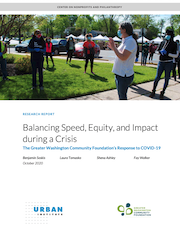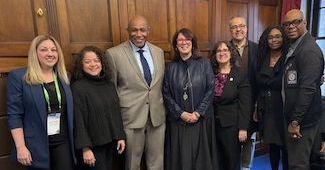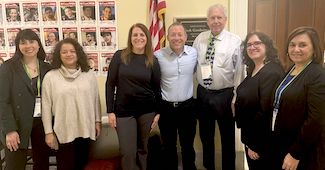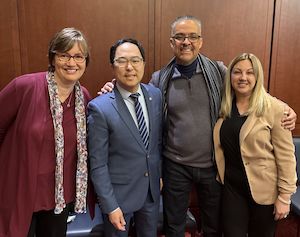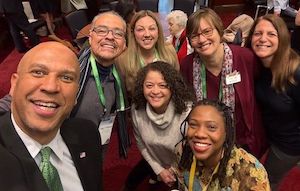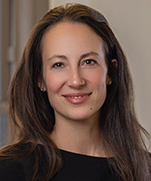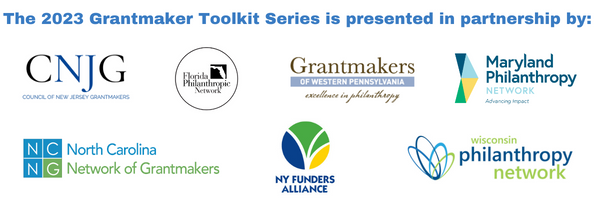Site Search
- resource provided by the Forum Network Knowledgebase.
Search Tip: Search with " " to find exact matches.
Part I: Supporting the social and emotional health of our communities
Join us as we begin a discussion on the trip back from COVID-19, and how we help to re-engage our teachers, students, and families after a two-year disruption. The first meeting will continue our exploration of the social and emotional toll of the pandemic and associated school closings, and ways that we might collaborate as a funder group on seeding solutions.
Panelists:
Jill Summers-Phillips, Principal at John F. Kennedy School
Positive Gunter - Parent
Yolanda Greene, Training Manager, Abbott Leadership Institute
Panel Facilitators:
Elizabeth Warner, President, SEL4NJ
Lauren Meehan, Facilitator – Director, Arts Ed Newark
Cost: Free for CNJG Members; $50 for Non Member Grantmakers.
Webinar Video
The administration’s current attempt to exclude and expel people through sweeping executive overreach in defiance of the rule of law is separating families and striking fear in communities, and is part of a broader attempt to criminalize and invisibilize historically marginalized populations, starting with noncitizens.
Join Grantmakers Concerned with Immigrant And Refugees to learn how advocates are addressing the closure of the border and the resulting denial of access to safety while others are defending people who have made the United States their home.
SPEAKERS
Lillian Aponte, Executive Director, Florence Immigrant and Refugee Rights Project
Erika Pinheiro, Executive Director, Al Otro Lado
Fatima Saidi, Director, We Are All America
MODERATORS
Basma Alawee, Deputy Executive Director, Community Sponsorship Hub
Zenobia Lai, Executive Director, Houston Immigration Legal Services Collaborative
REGISTRATION
There is no cost for this webinar.
You will need to log in or create an account on GCIR's website to register for this program.
Please register for this program by 5pm PT on Friday, April 25th.
Hosted by United Philanthropy Forum, in partnership with the Council on Foundations and Independent Sector, Foundations on the Hill (FOTH) is an annual opportunity for foundation executives, staff, and board members, philanthropy-serving organizations, and other philanthropic and social sector leaders to meet with their federal lawmakers, talk about issues of interest to philanthropy, and strengthen relationships with their representatives.
The overall purpose of Foundations on the Hill is to:
- Inform and educate Congress about philanthropy
- Advocate on issues affecting foundations
- Build CNJG’s relationships with lawmakers and their staff
- Create visibility for foundations and philanthropy on Capitol Hill
- Encourage Congress to view foundations as resources on key public policy issues
CNJG Makes Strong Showing at Foundations on the Hill 2025
The Council of New Jersey Grantmakers joined over 350 colleagues nationwide at Foundations on the Hill (FOTH) from February 23rd to 26th. This premier policy conference brought together the philanthropic sector for advocacy and education.
The CNJG delegation, led by our President and CEO Theresa Jacks, included Board Chair Craig Drinkard, Executive Officer, Victoria Foundation, Policy Co-chairs, Lucy Vandenberg, Executive Director, The Schumann Fund for New Jersey and William Engel, President, The Union Foundation, as well as a diverse group of foundation leaders representing various regions and interests across New Jersey. Notably, Linda Czipo, President and CEO of the New Jersey Center for Nonprofits, also participated, providing valuable insights from the nonprofit perspective.
FOTH offered a rich program beyond meetings with legislators. Attendees participated in conference sessions, learned about key national trends in philanthropy, and engaged with experts on critical issues like equitable grantmaking, tax reform, and the budget reconciliation process.
The CNJG delegation met with all New Jersey Congressional and Senate offices, including meeting directly with Congressmen Josh Gottheimer and Herb Conaway, and Senator Andy Kim, along with a photo meet-up with Senator Cory Booker. They advocated for the bipartisan Charitable Act, H.R.801/S.317). These bills modify and extend the deduction for charitable contributions for individuals who do not itemize deductions on their tax returns, thereby incentivizing charitable giving and encouraging greater philanthropic support for nonprofits and the communities they serve.
Beyond policy discussions and sharing what is happening on the ground in our state’s communities as a result of executive actions, FOTH provided valuable networking opportunities. The annual CNJG dinner fostered connections and relationships within the delegation, as well as time to debrief about what we were hearing on the Hill. Special thanks to Jermey Grunin, President, Grunin Foundation and Bill Engel for underwriting our dinner!
Overall, CNJG's participation in FOTH proved successful. By advocating for key legislation, educating Congress, and building relationships, CNJG helps ensure the voice of New Jersey philanthropy is heard on Capitol Hill.
2025 CNJG Delegation:
Carrie Bersak, Program Officer, The Burke Foundation
Sharif Braxton, Director, EQUIP NJ
Naeema Campbell, Program Officer, The Fund for New Jersey
Linda Czipo, President and CEO, New Jersey Center for Nonprofits
Kortney Swanson Davis, President and CEO, Forman S. Acton Educational Foundation
Craig Drinkard, Executive Officer, Victoria Foundation
William Engel, President, The Union Foundation
Alma Garcia, Director, Equity Ahora
Jeremy Grunin, President, Grunin Foundation
Theresa Jacks, President and CEO, CNJG
Jessica Johansen, Manager of Portfolio and Strategic Operations, The Tepper Foundation
Sharnita Johnson, Vice President, Victoria Foundation
Jessica Nugent, Senior Program Officer, The Burke Foundation
Katherine Nunnally, CEO, Smith Family Foundation
Jonathan Pearson, Executive Director, The Horizon Foundation for New Jersey
Shelley Skinner, Managing Director of Portfolios, The Tepper Foundation
Nelida Valentin, Vice President, Grants & Programs, Princeton Area Community Foundation
Lucy Vandenberg, Executive Director, The Schumann Fund for New Jersey
Renee Woodside, Associate Director, The Horizon Foundation for New Jersey
Hellen Zamora-Bustos, Grassroots Community Advocate, Equity Ahora
A working glossary of terms to help shape a common language for work in Community Capacity. This glossary is intended to help promote philanthropy's roles in building community capacity by defining core concepts and closely related terms.
A CNJG member received an application from a school district, and wanted to know if others granted funds to a school district, and what other funders learned from granting to a district.
Despite a field replete with research, analysis, recommended policies and practices — not to mention an abundance of educational programs and frameworks for grantmaking to diverse communities — philanthropic leaders have been slow to advance these values in their foundations. Philanthropy Northwest (PNW) wondered: what is getting in the way? Why are good intentions, buttressed with theory and practical advice, not achieving better results on measures of diversity, equity and inclusion?
With the support of the D5 Coalition, PNW began a year-long study to explore these questions. The study was divided into two parts. They began with personal interviews of 23 philanthropic leaders in the Pacific Northwest. In order to better understand how these organizations incorporated diversity, equity, and inclusion into their work and workplaces, they collected baseline information about their staff composition, leadership styles, and organizational practices/policies.
This report details their findings. It includes an in-depth look at the peer cohort model, in which ten foundation leaders met regularly to discuss these issues and support each other in advancing their own leadership. It also includes practical lessons about shifting organizational cultures towards greater diversity, equity and inclusion — lessons drawn directly from the experiences of peer cohort leaders.
PNW presented this work in a webinar hosted by the D5 Coalition. The webinar recording and slides are below.
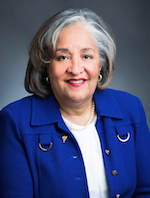 New Jersey’s largest philanthropic association has named longtime social sector leader Maria Vizcarrondo as its president.
New Jersey’s largest philanthropic association has named longtime social sector leader Maria Vizcarrondo as its president.
“Maria has been a trailblazer throughout her career,” said Council of New Jersey Grantmakers Board Chair William V. Engel. “We turn to her to help the state’s diverse and dedicated philanthropies to be even more effective in their quest to make this a better place.”
The Council of New Jersey Grantmakers is a nonprofit organization of over 130 members representing the philanthropic community in the state. Members include family, private, community, independent and corporate foundations, and corporate giving programs.
The Council exists to strengthen and promote effective philanthropy throughout New Jersey. CNJG’s programs and resources increase the impact of organized philanthropy’s support for adequate health care, quality education, a cleaner environment, community development, historical preservation, disaster response and relief, research, recreation, culture, and other areas crucial to the fabric of New Jersey's communities.
“I am very excited about joining the Council of New Jersey Grantmakers as its CEO and working with dynamic individuals — many of whom I have known and respected throughout my nonprofit career,” Ms. Vizcarrondo said. “Most importantly, I look forward to forging partnerships that will advance the Council’s social impact as a sector leader in New Jersey communities, the region, and nation.”
Ms. Vizcarrondo, who spent most of her career in northern New Jersey, comes to the Council from Cabrini University in Philadelphia, where she most recently was Director of Community Development and External Relations. She was inaugural Executive Director of the school’s Nerney Leadership Institute, launched in 2013.
Ms. Vizcarrondo brings more than 25 years of experience transforming service organizations and has served her communities as both an appointed and elected official.
In 2006, when he was first elected Mayor of Newark Cory Booker tapped Ms. Vizcarrondo to head Newark’s Health and Human Service Department, the largest of its kind in New Jersey. One of her first actions in that role was to develop a Children’s Bill of Rights to benchmark improvements in the lives of children and families throughout the city. Her accomplishments included securing state funding to establish Family Success Centers to provide neighborhood- based services, and launching a major citywide campaign to raise the immunization rates of Newark’s children.
Prior to her mayoral appointment, Ms. Vizcarrondo served as the first woman president and CEO of United Way of Essex and West Hudson. Her pioneer work in re-engineering the organization’s mission into community building was documented in the United Way Transformation Diaries. In the aftermath of the 9/11 attacks, Ms. Vizcarrondo led the New Jersey United Ways in a statewide coordination of services for affected families and managed the distribution of corporate funding for these efforts.
She was elected Essex County Surrogate in 1993 and served four years of a five-year term before leaving to join United Way.
Ms. Vizcarrondo has been listed among the “100 Most Influential People in New Jersey” and was a founding member of the New Jersey Institute for Social Justice.
###
With the overturning of Roe v. Wade, several states have either banned access to abortion care, or severely restricted access. As a result, states like New Jersey have seen a surge in individuals seeking care, further straining reproductive care providers. As New Jersey’s sole member of the National Network of Abortion Funds (NNAF), the New Jersey Access Abortion Fund advances abortion access and bodily autonomy by funding abortions for people traveling to, from, and within New Jersey. The very first portion of this briefing will be an update on the reproductive rights legal landscape from Attorney General Matthew J. Platkin. After the AG departs, we will then introduce attendees to NJAAF’s work and offer a frank conversation about economic barriers that making it difficult for individuals to seek care.
Speakers include:
Matthew J. Platkin, Attorney General, State of New Jersey
Hans Dekker, President, Community Foundation of New Jersey
Sheila Reynertson, Senior Program Officer, Robert Wood Johnson Foundation
Emily Zahn, Board Member, NJ Abortion Access Fund
Kathleen DiGiulio, Board Member, NJ Abortion Access Fund
Cost: Free for CNJG Members only
Quadira Coles (she/her)
Quadira Coles is a legislative/policy professional based in New Jersey/New York, committed to advocating for systemic and material changes that create liberating spaces and experiences for Black people, especially young people. She serves as the President of the New Jersey Abortion Access Fund. Her work focuses on reproductive and sexuality health justice and ending youth criminalization with a framework in Black Feminism. Her start in advocacy started when she began working directly with system-impacted youth through direct service and then worked on political campaigns and training young women to become community organizers. She has her Masters in Public Administration from John Jay College of Criminal Justice and Bachelors in Criminal Justice from Penn State University.
Emily Zahn (she/her)
Emily Zahn is the current Secretary of The New Jersey Abortion Access Fund. She has been a volunteer board member with NJAAF since 2022. With over ten years of experience in nonprofit organizing and fundraising, Emily has had the privilege of working for and volunteering with organizations including the National Institute for Reproductive Health, several Planned Parenthood affiliates, and California Women’s List. She currently works at ActBlue where she heads up their non-profit and PAC account management team. Emily is passionate about building community and connecting supporters to causes they care about in deep, meaningful ways. Emily holds a Master’s in Social Work from NYU and a BSW from Skidmore College.
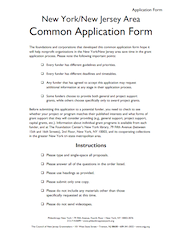
More than a decade ago, the Council of New Jersey Grantmakers and Philanthropy New York spearheaded a project to develop common application and report forms to help streamline the grant application process and ease the often time-consuming grant preparation process.
This application is a four-page form, which includes directions for use, a sample cover sheet, and the common grant proposal guidelines.
The separate Common Report Form follows closely the format of the New York/New Jersey Area Common Application Form.
Information for Grantmakers:
One of the core values at the Trust-Based Philanthropy Project (with whom CNJG partnered on a trust-based grantmaking learning series in the summer of 2021 – read about Part 1, Part 2, and Part 3) encourages funders to streamline their requirements for paperwork from nonprofits. Accepting the NY/NJ Area Common Grant Report Form is one way. Another is to accept reports from nonprofits that they submitted to a different funder.
Recent articles from Vu Le at NonprofitAF.com (We need to have a serious talk about character limits on grant applications and Trust-based grantmaking: What it is and why it’s critical to our sector), Joan Garry in the Chronicle of Philanthropy (A Plea from Community Nonprofits for Investment Equity and less Bureaucracy), and the research project by the Technology Association of Grantmakers (Grant Applications Share 39% Similarity According to New Research by TAG) in the summer of 2021 have re-focused attention on the concept of a common grant application.
CNJG encourages our members to review the application and report form, and consider accepting these forms (or using these questions on your online application / report form) from your current or potential grantees.
CNJG surveyed our members in August 2021 asking if they accepted the NY/NJ Area Common Grant Application and report form. CNJG members can download that report (link forthcoming).
Information for Grantseekers:
Before sending this (or any) application to any funder, be sure to check their specific funding guidelines and application requirements. Some funders require preliminary, additional, or supplementary information. Some funders only accept their own application form. CNJG members are under no obligation to accept either the common grant application or common grant report form.
Additional notes when using the NY/NJ Area Common Grant Application Form:
- Please check with each individual funder if they accept only their own form, the NY/NJ Area Common Grant Application form, or some other form.
- Funding area guidelines still apply. Research each organization’s funding areas to be sure your proposal fits within their guidelines before submitting your application.
- Any funder that has agreed to accept the NY/NJ Area Common Grant Application may request additional information at any stage in their application process.
- Every funder has different deadlines and timetables. Refer to each organization's funding and/or reporting guidelines.
- Do not submit the NY/NJ Area Common Grant Application or report form to the Council of New Jersey Grantmakers. Submit your application directly to the organization from which you are requesting support.
- Questions should be directed to the organization from which you are requesting support.
This one-hour webinar will offer a high-level overview of recent trends and best practices for foundation governance. Attorneys from the Nonprofit and Tax-Exempt Organizations group of Dentons, the world’s largest global law firm, will present practical tips for governance and legal compliance, focused on small to mid-size foundations. Drawing from both national trends in the industry and the impact of the pandemic and social change, topics will include:
- Considerations for revising bylaws and conflict of interest policies;
- Foundation political activity, including lobbying and advocacy;
- Issues to consider when funding a project with a fiscal sponsor; and
- Updating grant agreements.
Speakers
| Jeffrey Fromknecht Counsel Dentons Cohen & Grigsby |
Hayley Haldeman Counsel Dentons Cohen & Grigsby |
This program is for members of the following philanthropy-serving organizations: Maryland Philanthropy Network, Council of New Jersey Grantmakers, Florida Philanthropic Network, Grantmakers of Western Pennsylvania, Philanthropy Wisconsin, NY Funders Alliance, and North Carolina Grantmakers.
This program delves into the latest federal policies introduced at the national level and their specific implications for the state of New Jersey. This series will unpack how these policies affect various sectors such as immigration, healthcare, environment, education, housing, media and journalism, and arts and culture within New Jersey. Kevin Douglas, Senior Director of National Programs, Grantmakers Concerned with Immigrants and Refugees (GCIR), Amy Torres, Executive Director of the New Jersey Alliance for Immigrant Justice (NJAIJ), Johanna Calle, Director at the Office of New Americans (ONA) at the New Jersey Department of Human Services, and Stephanie Greenwood, Senior Strategy Officer for Victoria Foundation will share how the latest federal policies are affecting immigration.
Cost: Free for CNJG Members; $75 for Non Member Grantmakers
This program is only open to staff and trustees from grantmaking organizations.
Kevin Douglas (he/him/his) joined GCIR in 2019 and is the Senior Director of National Programs. He leads GCIR’s public policy work, manages the Advancing Economic Justice Community of Practice, and shapes strategic programming and funder resources. Previously, he served as Co-Director of Policy and Advocacy for United Neighborhood Houses of New York, where he led campaigns securing hundreds of millions of dollars in public investment for community services. He was recognized as one of New York Nonprofit Media’s 40 Under 40 and a Next Generation Leader by the Human Services Council. He also co-founded the giving circle 100 New Yorkers Who Care and has served on several boards, including the New York Immigration Coalition. Kevin holds an MSW from the University of Pennsylvania.
Amy Torres (they/them or she/her) leads the charge for immigrant rights as the Executive Director of the New Jersey Alliance for Immigrant Justice (NJAIJ). Since 2021, Torres has deepened NJAIJ's policy advocacy and grown its movement building programming. NJAIJ is now the largest immigration coalition in the state. Notable achievements include winning the East Coast's first statewide ban on immigration detention, New Jersey's inaugural language access law, and NJAIJ’s Advocacy Academy, a first of its kind training program that leverages case studies from successful New Jersey racial justice campaigns to empower the next generation of emerging organizers and activists. Prior to their role at NJAIJ, Torres led policy and advocacy efforts for the nation's largest AAPI social services organization. They have held positions from grasstops to grassroots in executive boards, academia, and local organizing. Torres credits their relentless pursuit of fairness, justice, and inclusion to their upbringing in a tight-knit immigrant family in West Texas. As a leader, Torres is anchored by the Filipinx value of 'kapwa' - a sense of self through others, and an unbreakable interconnection and responsibility to one’s community.
Johanna Calle is the Director at the Office of New Americans (ONA) at the New Jersey Department of Human Services. In this role, Ms. Calle works on identifying, developing, and executing policies and strategies to advance efforts to welcome and empower immigrant communities in the state. She will go over the work of the ONA and the work they are doing to support immigrant populations in our state, including overseeing programs around language access, refugee resettlement, and legal services.
Stephanie Greenwood serves as the Senior Strategy Officer for Victoria Foundation’s Economic Justice portfolio in Newark, NJ. She combines over twenty years of experience in public policy, advocacy, coalition-building, project management, and grants administration in the nonprofit, public, and philanthropic sectors. She brings a background in policy and resource mobilization for housing and environmental justice and a deep personal commitment to place-based, intersectional equity and justice to her work. She has the most fun working in big coalitions that are accountable to social movements and that push toward a healthy, just, regenerative economy that works for all of us. Before joining Victoria, she worked for the City of Newark for eight years with leadership roles in both housing and sustainability. Stephanie holds an undergraduate degree from Harvard University and a Masters of Public Affairs from the Princeton School of Public and International Affairs.
Cost: Free for CNJG Members; $75 for Non Member Grantmakers
This program is only open to staff and trustees from grantmaking organizations.
Webinar Video
Programs in this Series:
March 13: Making Sense of Federal Policy: Understanding What it Means for NJ: Immigration
March 20: Making Sense of Federal Policy: Understanding What it Means for NJ: Health
March 27: Making Sense of Federal Policy: Understanding What it Means for NJ: Environment
April 3: Making Sense of Federal Policy: Understanding What it Means for NJ: Education
April 10: Making Sense of Federal Policy: Understanding What it Means for NJ: Housing
April 17: Making Sense of Federal Policy: Understanding What it Means for NJ: Media & Journalism
April 24: Making Sense of Federal Policy: Understanding What it Means for NJ: Arts
Resources
GRIC: Fighting for our Future: Immigrant Rights and our Multiracial Democracy Recommendations for Philanthropy in 2025
- Frequent moves are the most significant barrier to academic success, as they disrupt both students and teachers. Students on the move need extra time and attention to get caught up, requiring teachers to spend more time with those students.
- Students who are unable to find stable shelter have difficulty meeting state or district mandates regarding the number of days they must attend school to stay enrolled.
- Often, the slow transfer of student records, along with differing course requirements from school to school, complicates the accrual of sufficient credits for homeless students to be promoted and receive a high school diploma.
